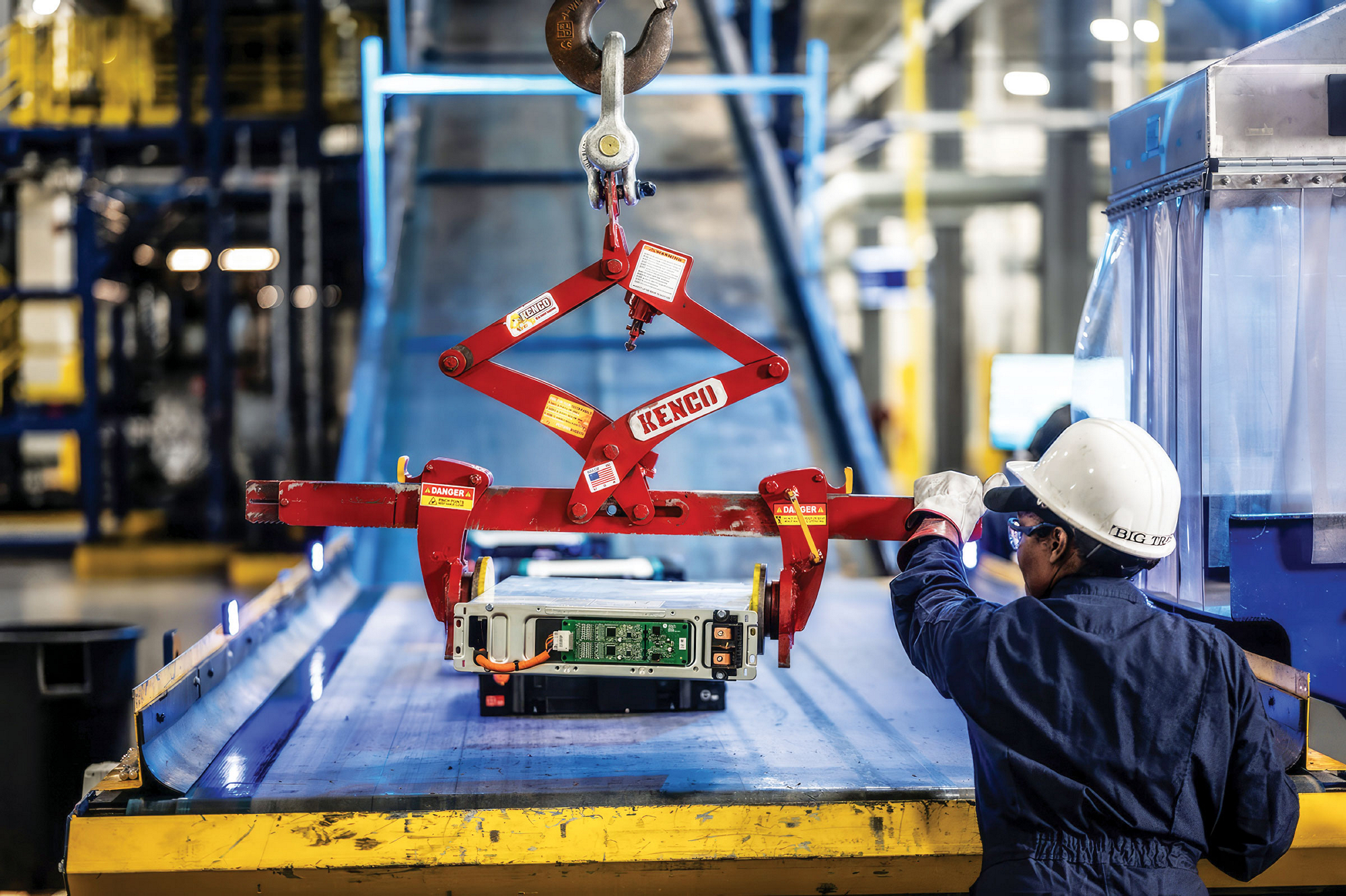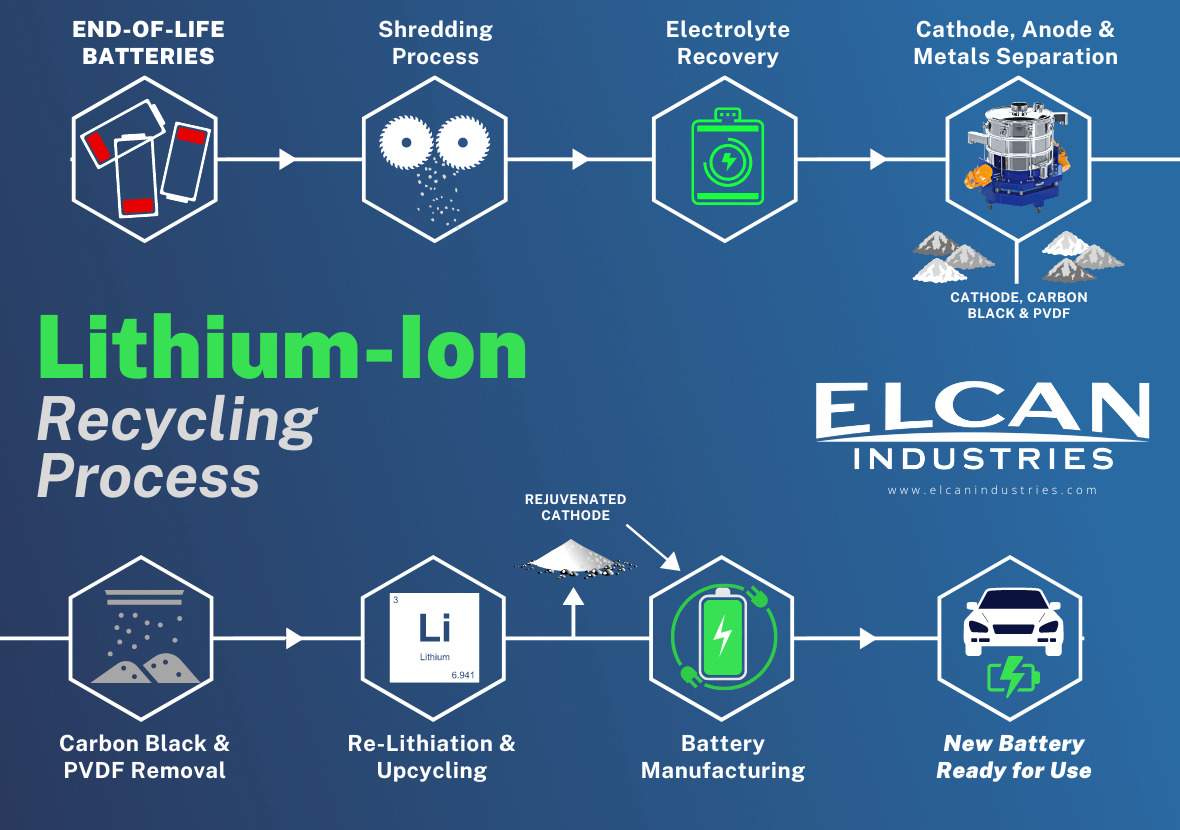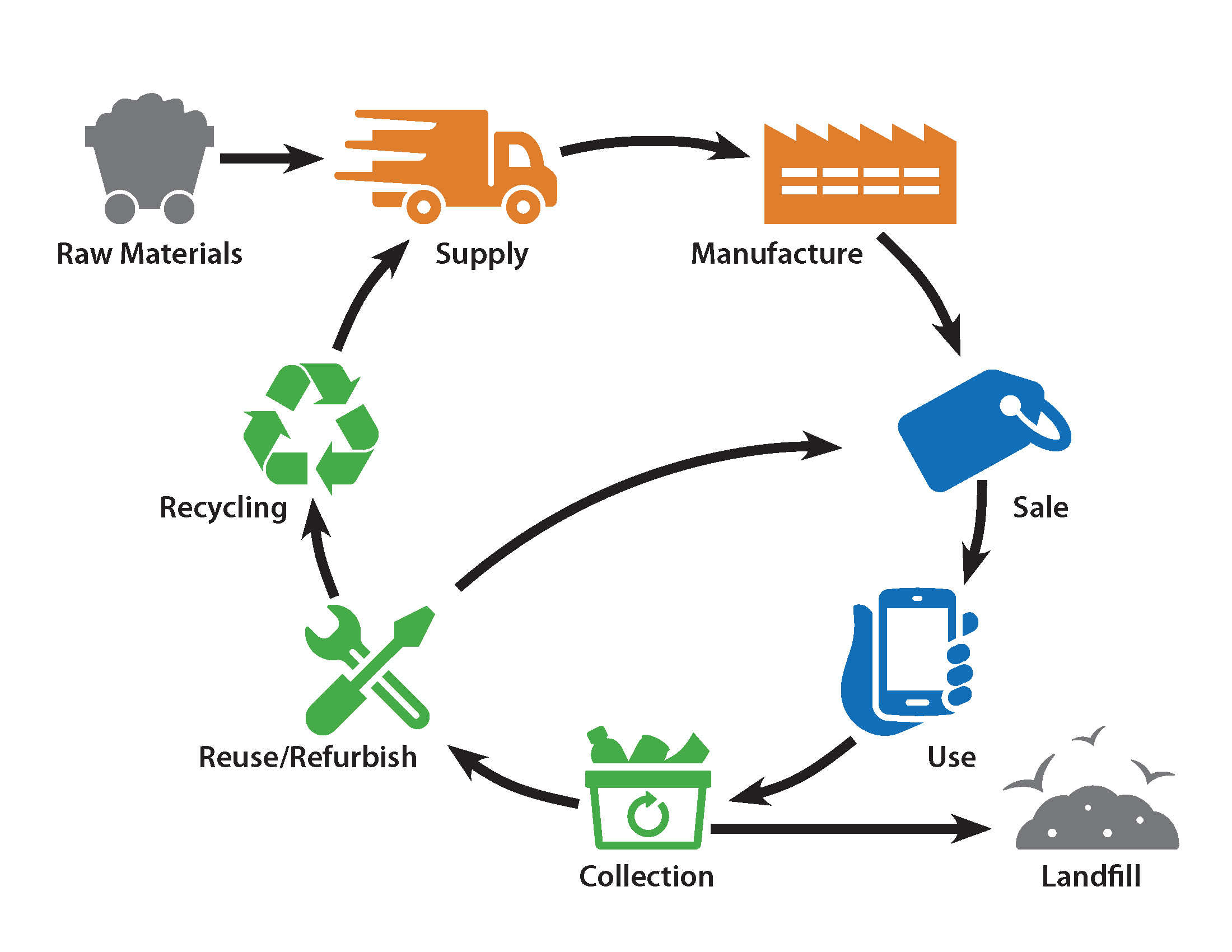Lithium-ion battery recycling is a process to recover valuable materials. It reduces waste and supports sustainable energy practices.
As the world shifts towards renewable energy, lithium-ion batteries play a crucial role in powering our devices and vehicles. But what happens when these batteries reach the end of their life? Recycling them is essential to minimize environmental impact and reclaim materials like lithium, cobalt, and nickel.
This process not only conserves resources but also helps in reducing the pollution associated with battery disposal. Understanding lithium-ion battery recycling is vital for anyone interested in sustainable living. It ensures we make the most of these powerful energy sources while protecting our planet. In the following sections, we explore the importance, methods, and benefits of recycling these batteries.

Credit: cen.acs.org
Introduction To Lithium Ion Batteries
Lithium ion batteries power many of today’s devices. They are in smartphones, laptops, and electric cars. Their popularity comes from their efficiency and lightweight design. Unlike traditional batteries, lithium ion batteries recharge quickly. They last longer, making them ideal for everyday use. Understanding their impact and recycling is crucial.
Rise In Popularity
Lithium ion batteries have become essential in modern life. Their demand is due to their high energy density. This means they store more power in a small size. As technology advances, more devices rely on these batteries. Electric vehicles depend on them for sustainable travel. This has made lithium ion batteries a preferred choice worldwide.
Environmental Impact
Despite their benefits, lithium ion batteries pose environmental concerns. They contain metals like cobalt and lithium. If not disposed of properly, these metals can harm ecosystems. Recycling helps reduce this impact. It prevents hazardous waste from polluting the environment. Recycling also conserves resources by reusing valuable metals.
Importance Of Recycling
Lithium-ion batteries power many devices today. They are in phones, laptops, and cars. Their demand keeps growing. Recycling these batteries is crucial. It protects our environment. It also preserves essential materials.
When batteries reach their end, they can harm the planet. Recycling them can reduce this risk. It ensures safe disposal. It also saves valuable resources. Recycling is more than just a solution. It is a necessity.
Reducing Waste
Recycling lithium-ion batteries cuts down on waste. These batteries often end up in landfills. They can leak harmful chemicals. Recycling stops this from happening. It keeps our soil clean. It protects water sources.
Less waste means a cleaner earth. It reduces pollution. It conserves natural habitats. Recycling is a step toward sustainability. It minimizes our environmental impact.
Conserving Resources
Lithium, cobalt, and nickel are in lithium-ion batteries. These materials are scarce. Recycling can recover them. It limits the need for new mining. Mining is costly and harmful to nature.
Conserving resources saves energy. It reduces carbon footprints. It maintains biodiversity. Recycling supports a green economy. It makes technology sustainable.
Challenges In Recycling
Lithium-ion battery recycling involves reprocessing used batteries to recover valuable materials. It faces challenges like cost, safety concerns, and limited recycling facilities. Efficient recycling methods can help reduce environmental impact and promote sustainable use of resources.
Recycling lithium-ion batteries is crucial to reducing environmental impact and conserving valuable resources. However, the process is not without its hurdles. Understanding these challenges can help you appreciate the complexity and importance of effective recycling solutions.
Complexity Of Materials
Lithium-ion batteries are made up of various components, including lithium, cobalt, nickel, and other metals. These materials are mixed in intricate ways, making separation a tricky task. Imagine trying to bake a cake with ingredients you can’t easily separate afterward. This complexity demands advanced technology and methods, which can be costly and time-consuming. Have you ever tried to solve a puzzle with missing pieces? Recycling these batteries can feel similar. The mixed materials require precise sorting and processing to reclaim valuable metals without contamination.
Safety Concerns
Safety is a top priority in battery recycling. Lithium-ion batteries can be volatile and pose risks such as fires and explosions. Handling and transporting them requires strict protocols to prevent accidents. Think about the precautions you take when handling fragile items; the same care is needed here but on a larger scale. Specialized equipment and trained personnel are essential for safe recycling operations. Consider your own experiences with electronic devices. Have you ever noticed warnings about battery disposal? These warnings highlight the potential hazards involved, emphasizing the need for proper safety measures. Recycling lithium-ion batteries presents significant challenges, yet addressing them is essential for sustainable progress. How can you contribute to safer and more efficient recycling practices? By staying informed and supporting advancements in technology and regulations, you play a part in shaping a cleaner future.
Recycling Technologies
Lithium-ion battery recycling involves recovering valuable materials from used batteries. It reduces waste and conserves resources. This process helps prevent environmental damage by safely handling toxic elements, promoting sustainable energy solutions.
### Recycling Technologies The world of lithium-ion battery recycling is a fascinating blend of cutting-edge technology and environmental responsibility. As the demand for these batteries rises, so does the need to efficiently recycle them. Different recycling technologies offer unique solutions to reclaim valuable materials and reduce waste. Let’s explore some of these technologies that are paving the way for a sustainable future.
Mechanical Processes
Mechanical processes are often the first step in recycling lithium-ion batteries. These methods focus on physically breaking down the batteries into smaller components. Imagine a large shredder that tears through the battery casing, separating metals, plastics, and other materials. This process is not just about destruction; it’s about precision. Sorting technologies are employed to ensure that valuable metals like lithium and cobalt are not lost. Have you ever wondered what happens to those old phones you recycle? They often go through this mechanical journey, turning yesterday’s electronics into tomorrow’s raw materials.
Chemical Methods
Chemical methods take recycling a step further by using chemical reactions to extract valuable materials. This approach can recover lithium, cobalt, and nickel in a pure form. The process involves dissolving battery components in acids or other solutions, allowing specific metals to be separated and collected. One fascinating aspect of chemical recycling is its ability to refine materials to a purity level suitable for new batteries. This means recycled materials can match the quality of newly mined resources. Could this be the future of sustainable battery production? It’s a question worth pondering as you consider the environmental benefits of such technologies. By understanding these recycling technologies, you gain insight into how your old gadgets can contribute to a greener planet. Next time you recycle, think about the journey your device might take and the innovative processes that help protect our environment.
Economic Benefits
Lithium-ion battery recycling offers significant economic benefits. As technology advances, the demand for these batteries grows. Recycling them not only protects the environment. It also opens up various economic opportunities. This process can enhance economic growth and sustainability.
Creating Jobs
Recycling lithium-ion batteries creates new jobs. As the recycling industry grows, it requires more workers. These jobs can range from collection to processing. Skilled technicians and engineers are needed. Training programs can help prepare the workforce. This ensures a steady supply of qualified workers.
Market Opportunities
The recycling of lithium-ion batteries opens up new markets. Recycled materials can be sold to battery manufacturers. This reduces the need for raw materials. It also lowers production costs. Companies can develop new technologies for better recycling. This creates competitive advantages in the market. Investors can find new business opportunities in this sector.

Credit: elcanindustries.com
Environmental Benefits
Lithium ion battery recycling offers significant environmental benefits. These benefits are vital for a sustainable future. Recycling helps reduce waste and conserves resources. It supports efforts to maintain ecological balance. Understanding these benefits can encourage more recycling practices.
Lower Carbon Footprint
Recycling batteries lowers the carbon footprint. It reduces the demand for new raw materials. Manufacturing new batteries consumes energy and emits carbon. Recycling uses less energy than producing new batteries. This helps decrease the overall carbon emissions. A smaller carbon footprint contributes to a cleaner environment.
Pollution Prevention
Battery recycling prevents pollution. It keeps harmful chemicals out of landfills. These chemicals can leak into the soil and water. Recycling ensures safe disposal of toxic materials. It protects air and water quality. This reduces pollution risks and safeguards natural habitats.
Current Global Efforts
Lithium-ion battery recycling is gaining global attention. This comes as the demand for these batteries rises. Many countries are making efforts to recycle and manage this e-waste. These initiatives aim to reduce environmental harm. They also focus on conserving valuable resources. Let’s explore the current global efforts in lithium-ion battery recycling.
Leading Countries
Several countries lead in lithium-ion battery recycling. China is at the forefront. It has extensive recycling facilities. The European Union also shows strong commitment. Countries like Germany and Belgium have advanced processes. The United States is catching up. It develops new technologies for efficient recycling.
Policy Initiatives
Many governments introduce policies to boost recycling. The EU has strict regulations on battery disposal. It encourages recycling through its Battery Directive. In the US, states like California implement similar regulations. They promote safe disposal and recycling. China’s government incentivizes companies. They support research and development in recycling technologies.
Future Prospects
Lithium-ion battery recycling involves reclaiming materials from used batteries to reduce waste and conserve resources. This process helps recover valuable components like lithium and cobalt, supporting sustainable energy solutions. As demand for electric vehicles and gadgets grows, recycling ensures a more eco-friendly future.
The future of lithium-ion battery recycling holds immense promise. With the growing demand for sustainable energy, recycling is crucial. It ensures a consistent supply of materials and reduces environmental impacts. Many industries are investing in research to improve recycling processes. This is leading to exciting developments in the field.
Innovations In Technology
New technologies are being developed to enhance recycling efficiency. Automated systems can now sort and process batteries faster. This reduces human error and increases safety. Researchers are exploring ways to recover more materials. Advanced chemical processes are making it possible. These innovations will lead to better resource management.
Increased Adoption
More companies are adopting recycling practices. This trend is driven by environmental concerns. Regulations are also playing a role. Governments are encouraging sustainable practices. As a result, recycling facilities are expanding. This growth is essential for meeting future demands. Increased adoption will make recycling more accessible to everyone.

Credit: www.sciencedirect.com
Frequently Asked Questions
What Is Lithium Battery Recycling?
Lithium battery recycling involves collecting, dismantling, and processing used batteries to recover valuable materials. This process reduces environmental impact and conserves resources by reusing metals like lithium, cobalt, and nickel. Recycling helps minimize waste and supports sustainable energy practices.
Is There Money In Recycling Lithium-ion Batteries?
Recycling lithium-ion batteries can be profitable. High demand for battery materials like lithium, cobalt, and nickel drives value. Efficient recycling processes can recover these materials, reducing costs and environmental impact. Companies investing in advanced technologies are capitalizing on this opportunity, making the recycling industry increasingly lucrative.
What Are The Disadvantages Of Recycling Lithium-ion Batteries?
Recycling lithium-ion batteries can be costly and labor-intensive. It poses environmental risks due to toxic chemicals. Inefficient recycling methods can lead to material loss. Battery components may degrade, reducing quality. Specialized facilities are needed, limiting accessibility.
Is Lithium-ion Battery Recycling Profitable?
Lithium-ion battery recycling can be profitable. Profitability depends on technology, market demand, and metal recovery efficiency. Valuable materials like cobalt and nickel boost profits. Costs include collection, transport, and processing. Innovation in recycling methods enhances profitability.
Conclusion
Recycling lithium-ion batteries is crucial for the environment. It reduces waste and conserves resources. By recycling, you help save valuable materials. This process also reduces pollution from mining. Plus, it limits toxic substances from entering ecosystems. Recycling can create jobs and boost the economy.
It’s a win-win for everyone involved. We all benefit from cleaner air and water. So, consider recycling your old batteries. Small actions lead to big changes over time. Every recycled battery counts. Let’s work together for a sustainable future. Your efforts make a real difference.
